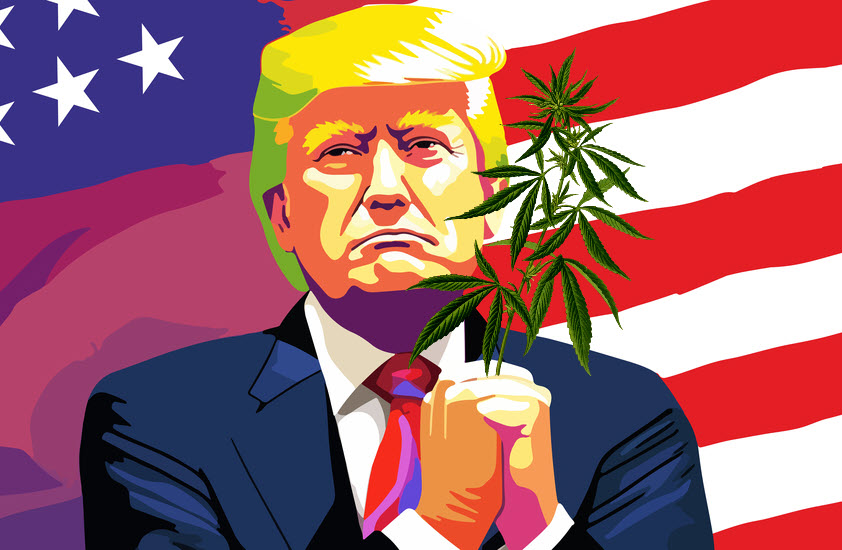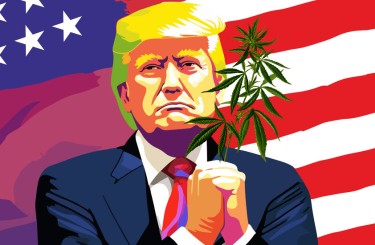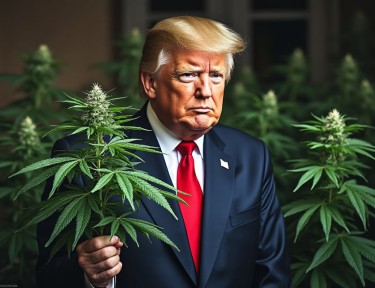Cannabis News
Everyone is Spiritual, No One is Religious
Published
10 months agoon
By
admin

The Role of Cannabis in Modern Day Spirituality
In recent times, cannabis has transcended its traditional image, morphing from a mere recreational substance to a significant topic of scientific inquiry and social discourse. This shift mirrors our evolving understanding of health, wellness, and personal freedom. Cannabis now stands at the crossroads of public health policy, technological innovation, and socio-cultural transformation.
The plant’s journey from the fringes of legality to the forefront of therapeutic potential is as fascinating as it is complex. With increasing legalization, cannabis has spurred a revolution in medical research, uncovering its potential in treating a range of conditions from chronic pain to mental health disorders. This evolution is not just scientific but deeply ingrained in our societal fabric, challenging long-held stigmas and opening new avenues for personal development and spirituality.
However, as we navigate this green renaissance, it’s essential to tread carefully. The discourse around cannabis is often clouded by misinformation and ideological biases. My role today is to cut through this haze, presenting a nuanced, informed, and critical perspective on all things cannabis. From debunking myths to exploring its role in personal growth and cultural phenomena, we embark on a journey to understand not just the plant, but its place in our lives and communities.
In the dawning of a new era, marked by shifts in cultural norms and a growing disillusionment with traditional institutions, cannabis emerges as a key player. This ancient plant, long entwined with human history, is poised to revolutionize our approach to wellness, spirituality, and community. As the stigma surrounding cannabis dissipates, its potential as a tool for holistic healing and personal growth gains recognition. Cannabis’s ability to enhance introspection, foster creativity, and promote a sense of connectedness positions it uniquely in the new age movement. It offers a bridge between the material and the spiritual, encouraging a deeper exploration of the self and the universe. As people increasingly seek alternatives to conventional religious practices, cannabis’s role in facilitating open-source spirituality and communal experiences becomes more significant. By integrating cannabis into various spiritual and self-development practices, we unlock its potential to catalyze personal and societal transformation in this new age.
There has been a notable decline in mainstream religious affiliation, a trend particularly evident in Western societies. According to Pew Research Center’s telephone surveys conducted in 2018 and 2019, 65% of American adults described themselves as Christians, down from 77% a decade earlier. Concurrently, the religiously unaffiliated – those identifying as atheists, agnostics, or “nothing in particular” – rose from 17% to 26%.
This shift reflects a broader societal transformation, where traditional religious structures are increasingly seen as incompatible with modern values and lifestyles. Reasons behind this change include a growing emphasis on individualism, the rise of scientific understanding that challenges religious dogmas, and a perception of hypocrisy within religious institutions. Additionally, the availability of diverse worldviews and philosophies through the internet has broadened individual horizons, allowing people to explore beyond the beliefs they were raised with. Is cannabis playing a role in the decline of religion?
As humans innately seek spiritual fulfillment, this decline in organized religion doesn’t equate to a decline in spirituality. Instead, there’s a growing interest in alternative spiritual practices. In this context, cannabis and psychedelics are gaining attention as tools for spiritual exploration. These substances are increasingly viewed not just for their recreational or medicinal properties, but also for their potential to induce profound, meaningful, and even mystical experiences. They are being integrated into spiritual practices for their ability to alter consciousness and provide insights that some find lacking in traditional religious settings.
For instance, the use of ayahuasca in spiritual ceremonies has seen a surge in interest in the West, mirroring an ancient tradition in South American indigenous cultures. Similarly, cannabis, with its long history of spiritual use in various cultures, is being revisited as a means of enhancing meditation, mindfulness, and personal insight. As these practices grow in popularity, they are creating new frameworks for spiritual engagement outside conventional religious paradigms, catering to a modern population that yearns for spiritual depth but seeks it on its own terms.
Cannabis has long been a subject of fascination and controversy, particularly regarding its role in personal spirituality. Its use as a tool for self-reflection and personal growth is well-documented, both anecdotally and increasingly in scientific research. Unlike other psychedelics such as LSD or psilocybin, which often catalyze profound, sometimes overwhelming, alterations in perception and consciousness, cannabis typically offers a more subtle, gentler introspective experience. This softer approach allows individuals to engage in self-reflection without the intensity and disorientation that can accompany stronger psychedelics.
For many, cannabis serves as a bridge to deeper parts of the psyche, gently peeling back layers of the subconscious. It often brings a heightened sense of awareness and sensitivity to the user’s inner thoughts and feelings, making it a valuable tool for introspection and self-discovery. This introspective quality can lead to significant personal growth, as individuals are able to confront and process emotions, thoughts, and memories that they might typically avoid or suppress.
The differences between cannabis and other psychedelics in spiritual experiences are significant. While substances like ayahuasca or LSD might induce intense visionary states and profound epiphanies, often viewed as direct communications from a divine or higher consciousness, cannabis tends to foster a more reflective and less visionary state. Its effects are more about enhancing the individual’s current state of consciousness rather than radically transforming it. This can make cannabis a more accessible and less intimidating option for those seeking spiritual growth without the intense journey that stronger psychedelics entail.
Regarding cannabis’s role in facilitating a connection with the divine or higher consciousness, it’s important to acknowledge that such experiences are deeply subjective and vary widely among individuals. For some, cannabis can indeed be a spiritual conduit, offering a sense of unity with the universe, a feeling of transcendence, or a deeper connection with a higher power. For others, its spiritual benefits are more grounded in the way it enhances mindfulness, empathy, and a sense of peace—qualities that can indirectly foster a deeper spiritual connection.
While cannabis may not induce the dramatic spiritual revelations associated with stronger psychedelics, its role in personal spirituality is nonetheless profound. Its capacity to enhance introspection, emotional understanding, and a sense of connectedness can be deeply transformative, making it a valuable ally on one’s spiritual journey.
As we hurtle into the Age of AI, our world is morphing at an unprecedented rate, fueled by a digital revolution that’s reshaping our very essence of being. Artificial Intelligence, this juggernaut of human ingenuity, is making information more accessible than ever before, but as we’ve witnessed with the rise of social media, it’s also driving a wedge between individuals, isolating us within echo chambers of our own digital creation. It’s in this paradoxical era of connected disconnection that cannabis, a plant steeped in ancient history and wisdom, emerges as a potential bridge, linking us to our intrinsic human essence and to each other.
A recent study sheds light on a fascinating aspect of cannabis use – its ability to enhance empathy among its users. This isn’t just idle speculation; it’s an empirical finding that suggests cannabis may play a pivotal role in countering the emotional and empathetic disconnect often exacerbated by our increasing reliance on digital interfaces. As we navigate a world where human interactions are increasingly mediated by screens and algorithms, the empathetic qualities fostered by cannabis could serve as a crucial anchor, maintaining our connection to our fellow humans.
Cannabis’s role, however, extends beyond just fostering empathy. As we plunge deeper into the digital universe, our collective consciousness is undergoing a radical evolution, one where artificial intelligence and human intellect intertwine to forge new paradigms of thought and existence. In this brave new world, cannabis and other plant medicines emerge not just as relics of a pre-digital era, but as vital conduits for spirituality and connection to the “Great Spirit” or “Source,” as some might call it.
This notion isn’t far-fetched when we consider the historical context of cannabis and other psychedelics. For millennia, these substances have been integral to various spiritual and shamanic practices, offering gateways to deeper understanding and communion with the world around us. In the Age of AI, they could serve a similar purpose – helping us stay grounded and connected to a sense of something greater than ourselves, even as we navigate the complexities of a digitally-dominated existence.
The potential of cannabis in this new age is profound. It could help balance the cerebral, often abstract nature of our interactions with AI, providing a grounding, humanizing counterpoint. In essence, cannabis could act as a mediator between the rapidly evolving digital intelligence and our fundamental human need for connection, empathy, and spiritual grounding.
As we stand at the crossroads of this digital revolution, the role of cannabis becomes increasingly significant. It offers a reminder of our shared humanity and a tool for maintaining our connection to each other and the world at large. In the age of artificial intelligence, cannabis stands not as an anachronism, but as a vital ally, helping us navigate the uncharted territories of our digital future while keeping our human spirit firmly intact.
In my journey with cannabis, I’ve discovered its profound spiritual essence. This plant, with its deep-rooted connection to earth and humanity, has been more than just a substance; it’s a spiritual aid. Each puff seems to weave a stronger bond with the earth, aligning my spirit with the natural world in a dance of symbiotic harmony. It’s not just about getting high; it’s an awakening, a realization that we’re part of something greater.
Through the haze of smoke, I’ve felt a deeper kinship with humanity, sensing the interconnectedness of all beings. Cannabis has been a key, unlocking doors to inner sanctuaries I never knew existed. It’s taught me to appreciate the now, to see the beauty in the mundane, and to understand the sacredness of the present moment. It’s been an ally through many ego-awakenings.
As we stand on the threshold of a new era, I’m excited to see how the next generation embraces this spiritual ally. With cannabis, we’re not just moving towards legalization and acceptance; we’re stepping into a brave new world of spiritual awakening and earthly connection. Let’s sit back, light up, and bear witness to this extraordinary unfolding.
CANNABIS AND SPIRITUAL GROWTH, READ ON…
You may like
Cannabis News
Latest Trump Weed Rumor – Trump Will Federally Deschedule and Decriminalize Cannabis, but Not Legalize It
Published
19 hours agoon
November 14, 2024By
admin

In a recent interview, former New Jersey Governor Chris Christie made headlines by asserting that President-elect Donald Trump will pursue significant reforms in federal policies regarding marijuana and cryptocurrency. As the nation grapples with evolving attitudes toward cannabis and the burgeoning digital currency market, Christie’s predictions have ignited discussions about the potential implications of such changes on both industries. This article delves into Christie’s insights, the current state of marijuana and cryptocurrency regulations, and the broader implications of these anticipated reforms.
The Current Landscape of Marijuana Legislation
Federal vs. State Laws
Marijuana remains classified as a Schedule I substance under the Controlled Substances Act (CSA), which places it in the same category as heroin and LSD. This classification has created a complex legal landscape where states have moved to legalize cannabis for medical and recreational use, while federal law continues to impose strict prohibitions. As of now, over 30 states have legalized marijuana in some form, leading to a burgeoning industry that generates billions in revenue.
Challenges Faced by the Cannabis Industry
Despite its legality in many states, the cannabis industry faces significant hurdles due to federal restrictions. These challenges include:
-
Banking Access: Many banks are hesitant to work with cannabis businesses due to fear of federal repercussions, forcing these businesses to operate largely in cash.
-
Taxation Issues: The IRS enforces Section 280E of the tax code, which prohibits businesses engaged in illegal activities from deducting normal business expenses, leading to disproportionately high tax burdens for cannabis companies.
-
Interstate Commerce: The lack of federal legalization prevents cannabis businesses from operating across state lines, limiting their growth potential.
Chris Christie’s Perspective on Marijuana Reform
Christie, a former presidential candidate known for his tough stance on drugs during his tenure as governor, has evolved his views on marijuana over the years. In his recent statements, he emphasized that Trump is likely to pursue descheduling cannabis, which would remove it from the Schedule I classification. This move would not only provide clarity for businesses operating in legal markets but also open avenues for banking and investment.
Christie highlighted that descheduling would allow for a more regulated market where safety standards could be established, thus protecting consumers. He believes that this approach aligns with a growing consensus among Americans who support legalization and recognize the potential benefits of cannabis use for both medical and recreational purposes.
The Future of Cryptocurrency Regulation = The Rise of Cryptocurrencies
Cryptocurrencies have surged in popularity over the past decade, with Bitcoin leading the charge as the first decentralized digital currency. The market has expanded to include thousands of alternative coins (altcoins), each with unique features and use cases. As cryptocurrencies gain traction among investors and consumers alike, regulatory scrutiny has intensified.
Current Regulatory Challenges
The cryptocurrency market faces several regulatory challenges that hinder its growth and adoption:
-
Lack of Clarity: Regulatory frameworks vary significantly across states and countries, creating confusion for investors and businesses.
-
Fraud and Scams: The rapid growth of cryptocurrencies has led to an increase in fraudulent schemes targeting unsuspecting investors.
-
Consumer Protection: Without clear regulations, consumers are often left vulnerable to risks associated with volatile markets.
Christie’s Vision for Crypto Regulation
Christie believes that under Trump’s leadership, there will be an effort to find a “sweet spot” for cryptocurrency regulation balancing innovation with consumer protection. He argues that overly stringent regulations could stifle growth in this emerging sector while too little oversight could expose consumers to significant risks.
In his view, a balanced regulatory framework would include:
1. Clear Definitions: Establishing clear definitions for different types of cryptocurrencies and tokens to differentiate between securities and utility tokens.
2. Consumer Protections: Implementing measures to protect investors from fraud while promoting transparency within the market.
3. Encouraging Innovation: Creating an environment conducive to innovation by allowing startups to thrive without excessive regulatory burdens.
Christie’s insights reflect a growing recognition among policymakers that cryptocurrencies are here to stay and that appropriate regulations are necessary to foster growth while safeguarding consumers.
Implications of Proposed Reforms
Economic Impact
The potential reforms proposed by Christie could have far-reaching economic implications:
-
Job Creation: Legalizing marijuana at the federal level could lead to significant job creation within the cannabis industry—from cultivation and production to retail sales.
-
Investment Opportunities: Descheduling cannabis would open up investment opportunities for institutional investors who have been hesitant due to federal restrictions.
-
Boosting Local Economies: Legal cannabis markets have proven beneficial for local economies through increased tax revenues and job creation.
Similarly, clear regulations around cryptocurrencies could stimulate investment in blockchain technology and related industries, fostering innovation and economic growth.
Social Justice Considerations
Both marijuana legalization and sensible cryptocurrency regulations have social justice implications:
-
Addressing Past Injustices: Legalizing marijuana could help rectify past injustices related to drug enforcement policies that disproportionately affected marginalized communities.
-
Financial Inclusion: Cryptocurrencies offer opportunities for financial inclusion for those underserved by traditional banking systems, particularly in low-income communities.
Political Landscape
The political landscape surrounding these issues is complex. While there is bipartisan support for marijuana reform among certain lawmakers, challenges remain in overcoming entrenched opposition. Similarly, cryptocurrency regulation has garnered attention from both sides of the aisle but requires collaboration to establish effective frameworks.
Conclusion
Chris Christie’s predictions about President-elect Donald Trump’s approach to federal marijuana descheduling and cryptocurrency regulation suggest a potential shift in U.S. policy that could significantly reshape both industries. As public opinion evolves on these issues, lawmakers have an opportunity to enact meaningful reforms that promote economic growth while ensuring consumer protection. The anticipated changes could foster a more robust cannabis industry that contributes positively to the economy and addresses social justice concerns, while clear regulatory frameworks for cryptocurrencies could encourage innovation and protect consumers in the digital economy. Stakeholders in both sectors are closely watching these developments, eager to see how potential reforms might impact their futures. While the realization of Christie’s predictions remains uncertain, it’s clear that the conversation around marijuana and cryptocurrency regulation is ongoing and far from settled.
TRUMP 2.0 ON CANNABIS REFORM, READ ON…
TRUMP 2.0 ON FEDERAL CANNABIS REFORM – WHAT DO WE KNOW?
Cannabis News
Webinar Replay: Post-Election Cannabis Wrap – Smoke ’em if You’ve Got ’em
Published
2 days agoon
November 13, 2024By
admin
On Thursday, November 7th, Vince Sliwoski, Aaron Pelley and Fred Rocafort held a post election discussion “Post-Election Cannabis Wrap – Smoke ’em if You’ve Got ’em”. Watch the replay!
Key Takeaways from the “Smoke ’em if You’ve Got ’em – 2024 Post Election Cannabis Wrap” Webinar:
- Panelists:
- Vince Sliwoski: Oregon Business lawyer specializing in cannabis and commercial real estate.
- Aaron Pelley: Experienced in cannabis law since Washington’s legalization in 2012.
- Fred Rocafort: Trademark attorney working closely with the cannabis team.
- Election Results Overview:
- Most 2024 cannabis ballot measures did not pass.
- Florida, South Dakota, and North Dakota saw failures.
- Nebraska became the 39th state to legalize cannabis for medical use when it passed two cannabis initiatives, Initiatives 437 and 438.
- Federal and State-Level Developments:
- Medical use is currently legal in 38 states, and 24 states allow recreational use.
- Republican support for marijuana legalization is growing.
- Federal Policy Implications:
- Schedule III Rescheduling: The process to move cannabis to Schedule III is ongoing, which could significantly impact the industry.
- Importance of Federal Appointments: The future of cannabis policy depends heavily on who is appointed to key positions in the administration.
- International and Domestic Trade:
- Schedule III status could ease import/export restrictions on cannabis.
- Unified control of House, Senate, and presidency might expedite legislative progress.
- Economic and Industry Impact:
- Cannabis stocks experienced volatility post-election, reflecting investor uncertainty.
- Federal legalization and banking reforms are crucial for industry stability and growth.
- Future Outlook:
- The potential for federal rescheduling remains strong, with hearings scheduled for early 2025.
- State-level initiatives and regulatory developments will continue to shape the industry.


“How Long Does One Puff of Weed Stay in Your System?”… This topic can be difficult to answer since it is dependent on elements such as the size of the hit and what constitutes a “one hit.” If you take a large bong pull then cough, it might linger in your system for 5-7 days. A moderate dose from a joint can last 3-5 days, whereas a few hits from a vaporizer may last 1-3 days.
The length of time that marijuana stays in the body varies based on a number of factors, including metabolism, THC levels, frequency of use, and hydration.
Delta-9-tetrahydrocannabinol, or THC, is the primary psychoactive component of cannabis. THC and its metabolites, which remain in your body long after the effects have subsided, are detected by drug tests.
Since these metabolites are fat-soluble, they cling to bodily fat molecules. They could thus take a while to fully pass through your system, particularly if your body fat percentage is higher.
THC is absorbed by tissues and organs (including the brain, heart, and fat) and converted by the liver into chemicals such as 11-hydroxy-THC and carboxy-THC. Cannabis is eliminated in feces at a rate of around 65%, while urine accounts for 20%. The leftover amount might be kept within the body.
THC deposited in bodily tissues ultimately re-enters the circulation and is processed by the liver. For frequent users, THC accumulates in fatty tissues quicker than it can be removed, thus it may be detectable in drug tests for days or weeks following consumption.
The detection time varies according to the amount and frequency of cannabis usage. Higher dosages and regular usage result in longer detection times.
The type of drug test also affects detection windows. Blood and saliva tests typically detect cannabis metabolites for shorter periods, while urine and hair samples can reveal use for weeks or even months. In some cases, hair tests have detected cannabis use over 90 days after consumption.
Detection Windows for Various Cannabis Drug Tests
Urine Tests
Among all drug tests, urine testing is the most commonly used method for screening for drug use in an individual.
Detection times vary, but a 2017 review suggests the following windows for cannabis in urine after last use:
– Single-use (e.g., one joint): up to 3 days
– Moderate use (around 4 times a week): 5–7 days
– Chronic use (daily): 10–15 days
– Chronic heavy use (multiple times daily): over 30 days
Blood Tests
Blood tests generally detect recent cannabis use, typically within 2–12 hours after consumption. However, in cases of heavy use, cannabis has been detected up to 30 days later. Chronic heavy use can extend the detection period in the bloodstream.
Saliva Tests
THC can enter saliva through secondhand cannabis smoke, but THC metabolites are only present if you’ve personally smoked or ingested cannabis.
Saliva testing has a short detection window and can sometimes identify cannabis use on the same day. A 2020 review found that THC was detectable in the saliva of frequent users for up to 72 hours after use, and it may remain in saliva longer than in blood following recent use.
In areas where cannabis is illegal, saliva testing is often used for roadside screenings.
Hair Tests
Hair follicle tests can detect cannabis use for up to 90 days. After use, cannabinoids reach the hair follicles through small blood vessels and from sebum and sweat surrounding the hair.
Hair grows at approximately 0.5 inches per month, so a 1.5-inch segment of hair close to the scalp can reveal cannabis use over the past three months.
Factors Affecting THC and Metabolite Retention
The length of time THC and its metabolites stay in your system depends on various factors. Some, like body mass index (BMI) and metabolic rate, relate to individual body processing, not the drug itself.
Other factors are specific to cannabis use, including:
– Dosage: How much you consume
– Frequency: How often you use cannabis
– Method of consumption: Smoking, dabbing, edibles, or sublingual
– THC potency: Higher potency can extend detection time
Higher doses and more frequent use generally extend THC retention. Cannabis consumed orally may remain in the system slightly longer than smoked cannabis, and stronger cannabis strains, higher in THC, may also stay detectable for a longer period.
How Quickly Do the Effects of Cannabis Set In?
When smoking cannabis, effects appear almost immediately, while ingested cannabis may take 1–3 hours to peak.
The psychoactive component THC produces a “high” with common effects such as:
– Altered senses, including perception of time
– Mood changes
– Difficulty with thinking and problem-solving
– Impaired memory
Other short-term effects can include:
– Anxiety and confusion
– Decreased coordination
– Dry mouth and eyes
– Nausea or lightheadedness
– Trouble focusing
– Increased appetite
– Rapid heart rate
– Restlessness and sleepiness
In rare cases, high doses may lead to hallucinations, delusions, or acute psychosis.
Regular cannabis use may have additional mental and physical effects. While research is ongoing, cannabis use may increase the risk of:
– Cognitive issues like memory loss
– Cardiovascular problems including heart disease and stroke
– Respiratory illnesses such as bronchitis or lung infections
– Mood disorders like depression and anxiety
Cannabis use during pregnancy can negatively impact fetal growth and development.
Duration of Effects
Short-term effects generally taper off within 1–3 hours, but for chronic users, some long-term effects may last days, weeks, or even months. Certain effects may even be permanent.
Bottom Line
The amount of time that cannabis remains in your system following a single use varies greatly depending on individual characteristics such as body fat, metabolism, frequency of use, and mode of intake. Frequent users may maintain traces of THC for weeks, whereas infrequent users may test positive for as little as a few days. Hair tests can disclose usage for up to 90 days, while blood and saliva tests identify more recent use. Urine tests are the most popular and have varying detection durations. The duration that THC and its metabolites are detectable will ultimately depend on a number of factors, including dose, strength, and individual body chemistry.
PEE IN A CUP COMING UP, READ ON..

Latest Trump Weed Rumor – Trump Will Federally Deschedule and Decriminalize Cannabis, but Not Legalize It

Webinar Replay: Post-Election Cannabis Wrap – Smoke ’em if You’ve Got ’em

I Had Just One Puff

Marijuana firms Eaze, Green Dragon find new life after $10 million capital infusion

Get some rest on Modified Grapes—November’s Leafly HighLight

Is Kratom Addictive? Understanding Dependence, Risks, and Safe Usage

New Rule, December 5: Oregon Cannabis Retailers, Processors and Labor Peace Agreements

The CBD Dog Treat Guide

Trippin’ Golf Balls – Can Magic Mushrooms Help Your Golf Game?

Australian Broadcasting Corp Alleges Military Veterans Have Been Targeted By Medicinal Cannabis Companies Via Social Media & Offered Free “Product”

Distressed Cannabis Business Takeaways – Canna Law Blog™

United States: Alex Malyshev And Melinda Fellner Discuss The Intersection Of Tax And Cannabis In New Video Series – Part VI: Licensing (Video)

What you Need to Know

Drug Testing for Marijuana – The Joint Blog

NCIA Write About Their Equity Scholarship Program

It has been a wild news week – here’s how CBD and weed can help you relax

Cannabis, alcohol firm SNDL loses CA$372.4 million in 2022

A new April 20 cannabis contest includes a $40,000 purse

Your Go-To Source for Cannabis Logos and Designs

UArizona launches online cannabis compliance online course
Trending
-

 Cannabis News2 years ago
Cannabis News2 years agoDistressed Cannabis Business Takeaways – Canna Law Blog™
-

 One-Hit Wonders2 years ago
One-Hit Wonders2 years agoUnited States: Alex Malyshev And Melinda Fellner Discuss The Intersection Of Tax And Cannabis In New Video Series – Part VI: Licensing (Video)
-

 Cannabis 1012 years ago
Cannabis 1012 years agoWhat you Need to Know
-

 drug testing11 months ago
drug testing11 months agoDrug Testing for Marijuana – The Joint Blog
-

 Education2 years ago
Education2 years agoNCIA Write About Their Equity Scholarship Program
-

 Cannabis2 years ago
Cannabis2 years agoIt has been a wild news week – here’s how CBD and weed can help you relax
-

 Marijuana Business Daily2 years ago
Marijuana Business Daily2 years agoCannabis, alcohol firm SNDL loses CA$372.4 million in 2022
-

 California2 years ago
California2 years agoA new April 20 cannabis contest includes a $40,000 purse






